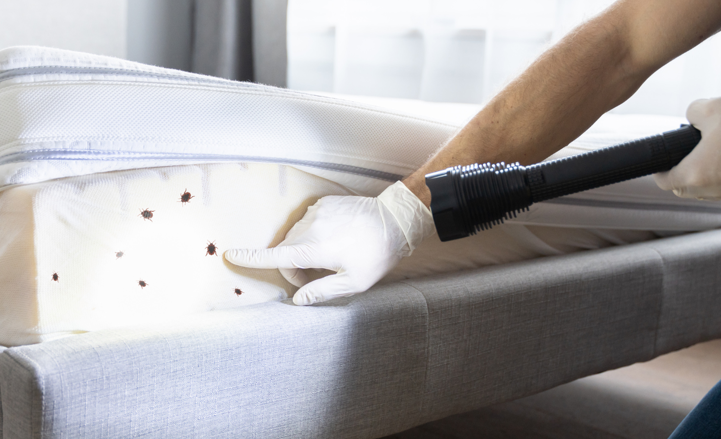Bed bugs are one of the most stubborn pests that can wreak havoc in our homes. They are known for their ability to bite, suck human blood, and cause skin irritation, resulting in sleepless nights and health problems. As commercial and residential homeowners, we are responsible for preventing these pests from entering our homes, but how do they spread? Here are some tips on how bed bugs spread and what you can do to stop them.
The Traveling Bed Bugs
Bed bugs are wingless and cannot jump, making it possible to crawl from one surface to another. They often hitchhike on travelers and their belongings, infesting suitcases, clothes, and other personal items. When travelers bring these items into their homes, they can easily spread to different areas, such as mattress seams, bed frames, couches, and carpets.
Unsanitary Living Conditions
Bed bugs thrive in warm environments and reproduce quickly, making it essential to keep our homes clean. If you leave clutter and dirty laundry lying around, they will use them as hiding places or breeding areas. Additionally, they can easily spread and infest different regions if you do not clean your home frequently.
Furniture and Bedding
Used furniture and bedding are among the leading causes of infestation. When purchasing pre-used items, you should inspect them thoroughly and ask the seller about their bed bug history. Some people dispose of bed bug-infested furniture and mattresses; if you pick them up, you risk starting an infestation in your home.
Neighbors in Multifamily Housing
If you live in multifamily housing, you are prone to bed bug infestations. They can quickly spread through wall voids, electrical outlets, and plumbing, making communicating with your neighbors about pest control essential. You should inspect your home frequently and alert your neighbors in case of an infestation.
Luggage Storage
Most hotels offer luggage storage services, and while it may seem like a convenient option, it can put you at risk of bed bug infestation. Bed bugs can quickly spread from one luggage to another, making it essential to inspect your luggage before packing and unpacking to/from storage facilities.
Treatment for Homes and Residential Properties
If you wake up with itchy and painful welts on your face and neck, you might have a bed bug infestation and spot a few tiny reddish-brown bugs crawling around your bedding. If left untreated, these blood-sucking pests can cause allergic reactions and wreak havoc on residential properties. Don’t let these creepy crawlers take over your home; protect your family’s health and property’s value by implementing effective bed bug treatment.
Heat Treatment
The heat treatment is a 100% organic and non-toxic approach to eliminate bed bugs in homes, apartments, and hotels. This treatment method involves heating the infested area to a temperature of 120-140°F, killing all bugs and their nymphs, and then sealing the location to prevent re-infestation. It’s the safest eradication because it doesn’t involve harmful insecticides and is the ideal option for allergies or asthma. However, ensure you hire a professional pest control company like Bug Masters, with experience in heat-treating bed bug infestations.
What is Integrated Pest Management?
Integrated Pest Management (IPM) combines various strategies and techniques to stop and control pests efficiently and effectively in an environmentally responsible manner. Many consider heat remediation one of the best forms of IPM for several reasons.
Non-toxic and Environmentally Friendly
Relying solely on heat, heat remediation is a non-toxic and environmentally friendly pest control method. It does not involve chemical pesticides or toxins that can harm human health, pets, or the environment.
Comprehensive Eradication
Heat remediation eliminates pests, including eggs, nymphs, and adults, at all life stages. Applying high temperatures in a controlled manner ensures the eradication of pests throughout the treated area, leaving no survivors.
Minimal Property Damage
Heat remediation is a safe and non-destructive pest control method that causes no harm to property or belongings. Unlike other methods, which might necessitate chemical usage or furniture removal, heat remediation leaves no residues, stains, or odors, ensuring the preservation of the treated space’s condition.
Quick and Convenient
The heat remediation process is quick and often completed in a single day. This convenience is especially beneficial for homeowners and businesses, minimizing disruptions and allowing occupants to return to their spaces promptly.
Effective Against Resistant Pests
Some pests have developed resistance to traditional chemical pesticides over time. Heat remediation, however, is effective against even pesticide-resistant strains, making it a reliable choice for challenging infestations.
Heat treatment eliminates pests in a single attempt, lowering the likelihood of their return. While the treatment may be more expensive than alternative methods, it delivers lasting effectiveness, safety, and environmental benefits. Thus, heat remediation presents an appealing choice for individuals seeking the most effective IPM approach to pest control.
Bug Masters Help Stop the Spread of Bed Bugs in Arkansas
Bed bugs are a nuisance and can cause significant discomfort, mental and physical health issues, and property damage. Acting quickly and employing effective treatment methods is essential. The highlighted methods are among the most efficient and safe bed bug treatment methods for homes and residential properties. However, the approach you choose should depend on the extent of the infestation, your budget, and your preferences. Before employing any pest treatment, consult an expert pest control service near you for proper guidance. Don’t let bed bugs take over your home; call Bug Masters today!


